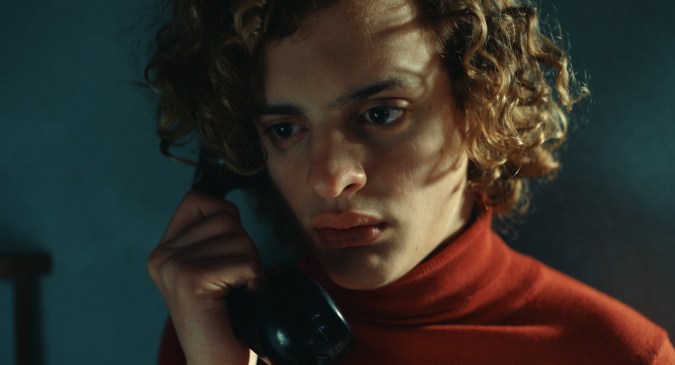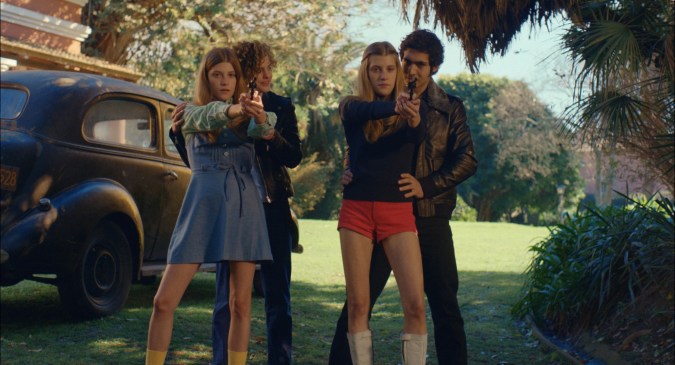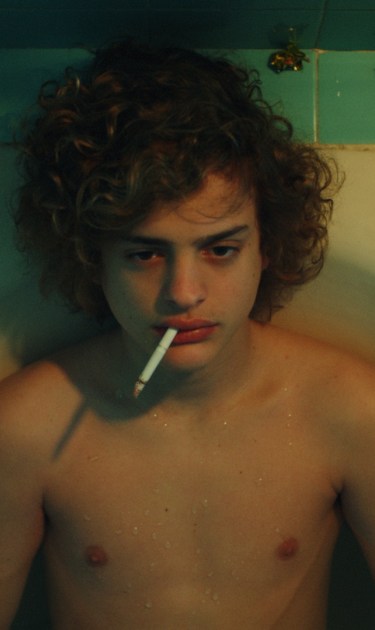For just under two hours, Luis Ortega’s El Angel allows us to get to know Carlitos Robledo (Lorenzo Ferro), a baby-faced kid in 1970s Argentina who just so happens to love robbing and even killing people. The type of teen who, even as he is being arrested for the first time, is blasting “El extraño de pelo largo” on the radio while dancing like he’s going to prom.
Then we see a montage of the news headlines about Carlitos’ arrest, trying to figure out why a nice boy like him could commit 11 murders and 17 robberies since, according to the papers, he doesn’t look the type. Among the headlines is one calling him “The Lady Face Chacal,” and another referring to the “dubious sexuality” of “The Black Angel” and his partner in crime. This is a film about our prejudices what we as a society think a killer would look like.
Coinciding with the premiere at the Toronto International Film Festival, director Luis Ortega talked to us about making a movie about a real person: “One of my best friends got to interview the real Carlitos in prison,” Ortega told Remezcla. “He ended up writing a wonderful book about his life, and I fell in love with the idea of completely rewriting this story and making it my own.”

It is a recurring theme in the film that Carlitos doesn’t lack anything in his life; he just robs people for fun. That was the key to Ortega’s version of the character, the one thing he thought was important to keep: “I was intrigued by what our idea of a criminal is. That the profile of a criminal is of an ugly, black, big-nosed, big-eared man, so when this cute mamma’s boy turns up people realized that there can be killers among us, and they can be good looking.”
To further sell the idea of Carlitos as a regular kid who happens to rob and kill, El Angel employs soft, warm colors to trick you into a feeling of safety. Then there’s the fantastic soundtrack featuring Argentine rock from the ‘60s and ‘70s that evokes a simpler time but also makes it feel like a Richard Linklater movie.
The film’s exploration of Carlitos’ sexuality is something that newspapers at the time only speculated about. Ortega told us he read between the lines on Rodolfo Palacios’ book: “I took it as him being in love with his friend and partner in crime, and wanted to center the film on the love story more than the crime story.”
Ortega uses Carlitos’ and his friend Ramón’s wavering sexuality to explore homophobia and prejudice both in ‘70s Argentina and anywhere today. Ramón (played by Chino Darín, the son of Ricardo Darín) engages in an affair with a male art dealer but keeps it a secret, while Carlitos doesn’t seem to know what he wants; he is just irresistibly drawn to his dark-hair classmate.

There is a contrast between the machismo and patriarchal culture of Latin America and the gay almost-love story between Carlitos and Ramón. El Angel shows the violence and power plays of men in Argentina and then cuts to Ramón struggling with his feelings towards the baby-faced Carlitos – to the point where the guns and violence start to become extensions of the characters’ sexuality and the desires they keep hidden.
But by taking artistic license with the sexuality of the lead character, Ortega plays into old and outdated film tropes about violent characters and serial killers being LGBTQ. Just like Psycho and Silence of the Lambs did for transgender people, this film damages the perception of gay men people by turning them into psychopaths. When asked, Luis Ortega didn’t see a problem with the representation of the LGBTQ community: “I don’t see it as him being gay influences his life of crime, those are just two aspects of his character. As a filmmaker you always make choices, and when dealing with true stories you choose what to take and what to leave out. There will always be criticism, but I see this as it being my own story, not a true one. And the reason for including that was to explore the Bonnie and Clyde aspect of the story, a love story connected to the crimes.” Yet it is hard to see how it was necessary to add a gay subplot to a character that not only never engages in sex but, because he commits horrid acts, adding this thematic element gives some people a quick answer as to why he acts the way he does.
In real life, though, Carlitos and his partner in crime are event worse than depicted in the film. They not only killed 11 people, but raped three women and even shot a newborn baby. For Luis Ortega, it was important to not go to deep into the darkness of the real story. “I don’t like going to the movies to see people raping women, shooting them in the face. I wanted to adapt it to my world, my teenager experience, and add a little Bonnie and Clyde.” Ultimately, he did find a way to make his young criminals likable and his serial killer movie a high-octane drama.
El Angel opens in theaters in New York and Los Angeles on November 9, 2018.




